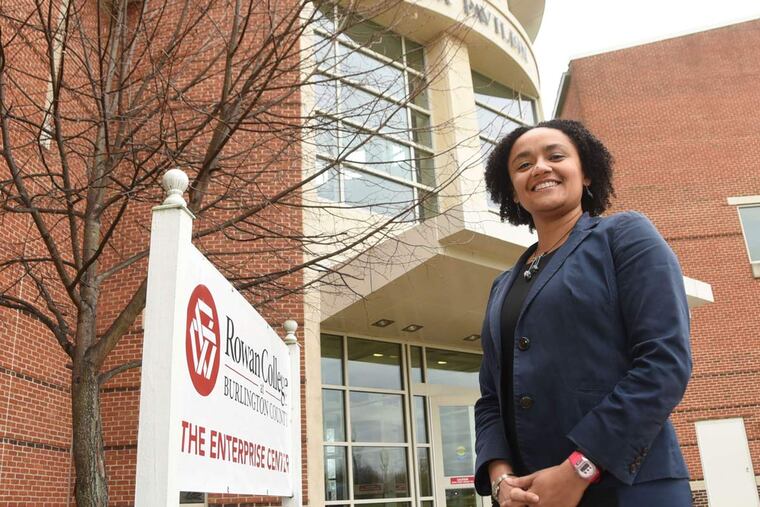How one community college develops workforce
Energy, utility, and construction companies need workers, but they often struggle to find the right recruits. "Number one, it's getting the word out that we're hiring. Number two, it's also getting the word out that a career in the energy industry is open to a broader population than job seekers may have thought," said Sally J. Nadler, who heads workforce development efforts at PSEG.

Energy, utility, and construction companies need workers, but they often struggle to find the right recruits.
"Number one, it's getting the word out that we're hiring. Number two, it's also getting the word out that a career in the energy industry is open to a broader population than job seekers may have thought," said Sally J. Nadler, who heads workforce development efforts at PSEG.
The company is particularly looking to bring more women into jobs replacing gas mains, upgrading energy substations, and reading meters, she said. But it lacked a pipeline to potential candidates.
So Nadler decided to build her own network. She and other companies entered a partnership with Rowan College at Burlington County to develop Women in Sustainable Employment (WISE), a weeklong introductory course on the energy and construction industries.
It was the first program created and run by a newly formed Workforce Development Institute at the Burlington County community college, a partnership of county and college employees.
The college, formerly known as Burlington County College, announced last month that it had hired Anna Payanzo Cotton to the new position of vice president of workforce development and lifelong learning. Payanzo Cotton, who had been the county's human services director since 2013, started this month and heads the Workforce Development Institute.
She describes the institute as a hub, sometimes providing specific training and courses but often doing the work of connecting private industry with college and county resources. The goal is to respond to employer needs, Payanzo Cotton said, by finding and training job seekers.
"Even though the institute is housed at the college, it's not about what we at the college do in a vacuum, or what we do for our students - it's about what we as a system across the county do well together," she said.
That system includes the county, the college, libraries, K-12 school systems, and employers. Companies with representation on a newly formed economic advisory panel include the Virtua health-care system, Fulton Bank, and Burlington Volkswagen.
Those business leaders, Payanzo Cotton said, "help us understand what their trends are, what their employment needs are, what their economic growth projections are, where they were going to need to have to be preparing for change."
Community colleges have long been an important recruiting and training ground for local businesses. The difference in Burlington County, Payanzo Cotton said, is the way the institute is trying to connect different groups.
"We're sitting down with industry partners and finding out what their needs are in a way that's, I believe, much more responsive than what's been the kind of historical practice," Payanzo Cotton said. "It's just more comprehensive in the way that it's happening now."
Some programs are focused on student demand, regardless of market need. The institute also runs its own programs, such as the WISE training, but in many cases acts in an advisory role. Job seekers coming in through a library, for example, may be evaluated for their existing skills, experience, and interests. They are then introduced to various industries and jobs and connected to employers, apprenticeship programs, college-run training and degree programs.
"The linkage between workforce development and higher education really should be much, much closer than it's been in the past," said Paul Drayton, president of Rowan College at Burlington County.
The WISE program, first offered at the end of September, discussed specific jobs and industries but also included resumé work and interviewing skills. One of the guest speakers led a conversation with the 29 participants about sexual harassment and other situations that women in male-dominated fields may face.
Last week, the institute announced three new programs that demonstrate its breadth of offerings.
One, a nine-course program aimed at those hoping to start a business in the construction or building trades, is similar to traditional certificate programs at the community colleges. The program is offered through the college itself and covers topics including writing business plans and public bidding.
Another program is a set of entrepreneurial workshops held at the county library headquarters in Westampton.
The institute also announced the third annual Startup Star competition, supported by TD Bank, for community college and high school students to develop and present business plans.
In the spring, the institute will again offer the weeklong WISE program that prepared Darlene Barrington for her new job as an engineering project manager.
Though the job isn't in the program's energy or construction industries - "the opportunities didn't open up there first" - it still places Barrington in an environment dominated by men.
"The program prepared me for that. It was a really, really good experience," said Barrington, who also credited the program with helping her edit her resumé and practice interviewing skills.
"It didn't matter what age you were, it was a very insightful program that would have helped any woman at any age."
856-779-3220 @elaijuh